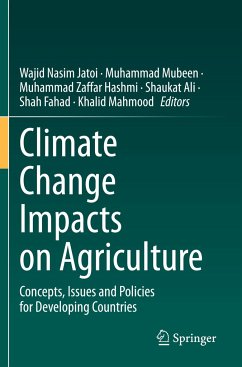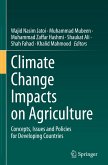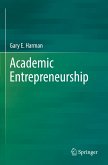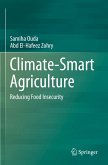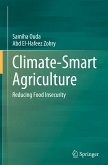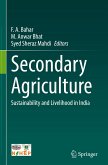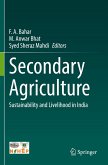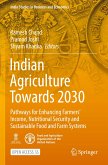Climate Change Impacts on Agriculture
Concepts, Issues and Policies for Developing Countries
Herausgegeben:Jatoi, Wajid Nasim; Mubeen, Muhammad; Hashmi, Muhammad Zaffar; Ali, Shaukat; Fahad, Shah; Mahmood, Khalid
Climate Change Impacts on Agriculture
Concepts, Issues and Policies for Developing Countries
Herausgegeben:Jatoi, Wajid Nasim; Mubeen, Muhammad; Hashmi, Muhammad Zaffar; Ali, Shaukat; Fahad, Shah; Mahmood, Khalid
- Broschiertes Buch
- Merkliste
- Auf die Merkliste
- Bewerten Bewerten
- Teilen
- Produkt teilen
- Produkterinnerung
- Produkterinnerung
This book offers perspective on climate change impacts on developing nations from scholars within those nations, primarily focusing on agriculture. Throughout three parts containing a total of over twenty chapters from scholars in developing countries, it aims to offer guidelines for researchers, policymakers, and farmers themselves on how developing countries can achieve sustainable food security and continue development on a sustainable basis. Part I covers climate change concepts and issues for developing countries; Part II offers chapters dealing with social issues surrounding climate…mehr
Andere Kunden interessierten sich auch für
![Climate Change Impacts on Agriculture Climate Change Impacts on Agriculture]() Climate Change Impacts on Agriculture134,99 €
Climate Change Impacts on Agriculture134,99 €![Academic Entrepreneurship Academic Entrepreneurship]() Gary E. HarmanAcademic Entrepreneurship64,99 €
Gary E. HarmanAcademic Entrepreneurship64,99 €![Climate-Smart Agriculture Climate-Smart Agriculture]() Samiha OudaClimate-Smart Agriculture112,99 €
Samiha OudaClimate-Smart Agriculture112,99 €![Climate-Smart Agriculture Climate-Smart Agriculture]() Samiha OudaClimate-Smart Agriculture112,99 €
Samiha OudaClimate-Smart Agriculture112,99 €![Secondary Agriculture Secondary Agriculture]() Secondary Agriculture171,19 €
Secondary Agriculture171,19 €![Secondary Agriculture Secondary Agriculture]() Secondary Agriculture119,99 €
Secondary Agriculture119,99 €![Indian Agriculture Towards 2030 Indian Agriculture Towards 2030]() Indian Agriculture Towards 203030,99 €
Indian Agriculture Towards 203030,99 €-
-
-
This book offers perspective on climate change impacts on developing nations from scholars within those nations, primarily focusing on agriculture. Throughout three parts containing a total of over twenty chapters from scholars in developing countries, it aims to offer guidelines for researchers, policymakers, and farmers themselves on how developing countries can achieve sustainable food security and continue development on a sustainable basis.
Part I covers climate change concepts and issues for developing countries; Part II offers chapters dealing with social issues surrounding climate change and agriculture; Part III addresses practical policies that can be implemented to work toward achieving the goals described above. Agriculture is a key sector in developing countries in terms of economic growth and social well-being. Adapting and building resilience to climate change means increasing agricultural productivity and incomes and reducing greenhouse gases emissions. This volume represents an effort toward collecting knowledge on the technical, policy and investment measures to achieve sustainable agricultural growth in the sectors of grain, fruit, vegetable, fiber, feed, livestock, fisheries and forest under climate change in one place.
Part I covers climate change concepts and issues for developing countries; Part II offers chapters dealing with social issues surrounding climate change and agriculture; Part III addresses practical policies that can be implemented to work toward achieving the goals described above. Agriculture is a key sector in developing countries in terms of economic growth and social well-being. Adapting and building resilience to climate change means increasing agricultural productivity and incomes and reducing greenhouse gases emissions. This volume represents an effort toward collecting knowledge on the technical, policy and investment measures to achieve sustainable agricultural growth in the sectors of grain, fruit, vegetable, fiber, feed, livestock, fisheries and forest under climate change in one place.
Produktdetails
- Produktdetails
- Verlag: Springer / Springer International Publishing / Springer, Berlin
- Artikelnr. des Verlages: 978-3-031-26694-2
- 2023
- Seitenzahl: 448
- Erscheinungstermin: 16. Juni 2024
- Englisch
- Abmessung: 235mm x 155mm x 25mm
- Gewicht: 675g
- ISBN-13: 9783031266942
- ISBN-10: 3031266943
- Artikelnr.: 70973487
- Herstellerkennzeichnung Die Herstellerinformationen sind derzeit nicht verfügbar.
- Verlag: Springer / Springer International Publishing / Springer, Berlin
- Artikelnr. des Verlages: 978-3-031-26694-2
- 2023
- Seitenzahl: 448
- Erscheinungstermin: 16. Juni 2024
- Englisch
- Abmessung: 235mm x 155mm x 25mm
- Gewicht: 675g
- ISBN-13: 9783031266942
- ISBN-10: 3031266943
- Artikelnr.: 70973487
- Herstellerkennzeichnung Die Herstellerinformationen sind derzeit nicht verfügbar.
Wajid Nasim Jatoi serving Department of Agronomy, Faculty of Agriculture & Environment, The Islamia University of Bahawalpur (IUB), Pakistan since November 21, 2019. Before joining IUB, he served the Department of Environmental Sciences, COMSATS University Islamabad (Vehari Campus), Pakistan for 08 years, and Quaid-i-Azam University Islamabad, (Pakistan) for 01 year at different positions. Furthermore, he completed his Post Doctorates from FRANCE & from AUSTRALIA in the field of Climate Change & Food Security Sustainable/Precision Agriculture. Before Post Doctorates, he completed his PhD training from "College of Agriculture & Environmental Sciences, The University of Georgia, USA. Recently established and also working as Focal Person in Consortium on Climate Change, Sustainability & Conservation (CCSC), & as Director, International Center for Climate Change, Food Security & Sustainability (ICCFS), The Islamia University of Bahawalpur, Pakistan. Furthermore, he has completed many national & International Research Projects in collaboration with Columbia University, USA; International Food Policy Research Institute (IFPRI), USA; CIHEAM-IAMM France etc. He has produced more than 50 under graduates & post graduates students. He published more than 100 peer reviewed research publications (with more than 400 Impact Factor) and organized more than 50 national and international conferences/seminars/workshops and attended more than 50 national & international conferences/seminars/workshops as invited/keynote speaker, also write International book "Building Climate Resilience in Agriculture" as first editor published by Springer Nature. Dr. Muhammad Mubeen has been working as Tenured Associate Professor at Department of Environmental Sciences, COMSATS University Islamabad, Vehari Campus (Pakistan) since April, 2022. His areas of interest include Agronomy, Climate change and Agro-meteorology, Crop Growth Modeling, Remote sensing and GIS and Water management. He has expertise in Cropping system model "Decision Support System for Agro-technology Transfer (DSSAT) and GIS softwares (ArcGIS and ERDAS). He has over 100 publications in national and international peer reviewed journals and books over his areas of expertise. He is reviewer of many national and international well-reputed journals. He is also editor of international book "Building Climate Resilience in Agriculture-Theory, Practice and Future Perspective". Dr. Muhammad Zaffar Hashmi is working in the Department of Chemistry at COMSATS University Islamabad Campus, Pakistan. Dr. Hashmi works on multiple water, soil, air and health related issues, and has expertise in developing environmentally sustainable and feasible technologies. Dr Shaukat Ali holds PhD in Meteorology from the Institute of Atmospheric Physics (IAP), Chinese Academy of Sciences (CAS). He also has an LLB degree with a special focus on Environmental Law. Currently, He is working as Senior Scientific Officer in Global Change Impact Study Centre (GCISC), Ministry of Climate Change, Government of Pakistan. He started his career as a lecturer at the University and then worked for different government departments in Pakistan. Dr Ali has also worked as a consultant for Asian Development Bank. He is a visiting research scholar to 1. Abdus Salam International Centre for Theoretical Physics (ICTP), Trieste, Italy, 2. International Institute for Applied Systems Analysis (IIASA), Vienna, Austria and 3. APEC Climate Center (APCC), Busan, Korea. He is leading a regional research project (CRRP2018-04MY-Ali) funded by Asia Pacific Network on Global Change Research (APN). His peer-reviewed publications cover topics ranging from climate modelling, future projections of climate, extreme events and impact assessment of climate change. He is involved in multiple efforts to communicate scientific research on climate change to the public and policymakers. Dr Shah Fahad is working in the Department of Agronomy, Abdul Wali Khan University Mardan, Khyber Pakhtunkhwa, Pakistan. He obtained his PhD in Agronomy from Huazhong Agriculture University, China, in 2015. After doing his postdoctoral research in Agronomy at the Huazhong Agriculture University (2015-17), he accepted the position of Assistant Professor at the University of Haripur. He has published over 430 peer-reviewed papers (Impact factor 1834) with more than 370 research and 60 review articles, on important aspects of climate change, plant physiology and breeding, plant nutrition, plant stress responses and tolerance mechanisms, and exogenous chemical priming-induced abiotic stress tolerance. He has also contributed 80 book chapters to various book editions published by Springer, Wiley-Blackwell, and Elsevier. He has edited seventeen book volumes, including this one, published by CRC press, Springer, and Intech Open. He won Young Rice InternationalScientist award and distinguish scholar award in 2014 and 2015 respectively. He won 17 projects from international and national donor agencies. Dr Shah Fahad figured in the Clarivate's 2021and 2022 lists of Highly Cited Researchers. His name included among the top 02% scientists in a global list compiled by the Stanford University, USA. Dr KhalidMahmood has PhD in agriculture economics from the University of Gottingen, Germany, and Fellow of the Higher Education Academy of England. For the last decade, he is working with the Rothamsted Research Institute in the UK which has a history of the world's longest-running experience on crop nutrition starting back in 1843. In the past, he worked with Federal Agri Research Von Thunen Institute, Germany, Royal Agriculture University, UK, and Agri & Horticulture Board (AHDB), UK. He is leading in developing research and partnerships in sustainable agriculture, soil health, bio-saline agriculture, and smart crop protection especially innovative solutions for climate-smart agriculture in the Middle East & North Africa.
Chapter 1. Global Framework on Climate Change.- Chapter 2. Conceptual Elucidation of Climate Change for Developing Countries.- Chapter 3. Climate Change and Social Concerns.- Chapter 4. Unpredictable Weather and Agriculture-Based Economy of Developing Countries.- Chapter 5. Nutrition-Sensitive Climate-Smart Agriculture.- Chapter 6. Food Security Issues in Changing Climate.- Chapter 7. Engineering Principles of Precision Farming: Pathway for the Developing Countries to Ensure Food Security.- Chapter 8. GHG management implications for developed and developing nations.- Chapter 9. Concept of Climate Finance.- Chapter 10. Need of Social Security in Vulnerable Countries - A Comparison of a Developed and a Developing Country.- Chapter 11. Climate and Development.- Chapter 12. Sustainable development goals and governments' roles for social protection.- Chapter 13. Integrated farming approach.- Chapter 14. An overview of precision agricultural technologies for crop yield enhancement and environmental sustainability.- Chapter 15. Irrigation Scheduling under Crop Water Requirements: Simulation and Field Learning.- Chapter 16. Nutrient Management Under Changing Climate.- Chapter 17. Modern Breeding approaches for climate change.- Chapter 18. Heat stress tolerance in crop plants-physiological and biochemical Approaches.- Chapter 19. Crop protection under climate change: the effect on tri-trophic relations concerning pest control.- chapter 20. Climate Change Effects on the Quality of Different Crop Plants and Coping Mechanisms.- Chapter 21. Application of Remote Sensing in Agriculture.- Chapter 22. Mitigation of climate change through carbon farming.- Chapter 23. Use of Biochar for Biological Carbon Sequestration.
Chapter 1. Global Framework on Climate Change.- Chapter 2. Conceptual Elucidation of Climate Change for Developing Countries.- Chapter 3. Climate Change and Social Concerns.- Chapter 4. Unpredictable Weather and Agriculture-Based Economy of Developing Countries.- Chapter 5. Nutrition-Sensitive Climate-Smart Agriculture.- Chapter 6. Food Security Issues in Changing Climate.- Chapter 7. Engineering Principles of Precision Farming: Pathway for the Developing Countries to Ensure Food Security.- Chapter 8. GHG management implications for developed and developing nations.- Chapter 9. Concept of Climate Finance.- Chapter 10. Need of Social Security in Vulnerable Countries - A Comparison of a Developed and a Developing Country.- Chapter 11. Climate and Development.- Chapter 12. Sustainable development goals and governments' roles for social protection.- Chapter 13. Integrated farming approach.- Chapter 14. An overview of precision agricultural technologies for crop yield enhancement and environmental sustainability.- Chapter 15. Irrigation Scheduling under Crop Water Requirements: Simulation and Field Learning.- Chapter 16. Nutrient Management Under Changing Climate.- Chapter 17. Modern Breeding approaches for climate change.- Chapter 18. Heat stress tolerance in crop plants-physiological and biochemical Approaches.- Chapter 19. Crop protection under climate change: the effect on tri-trophic relations concerning pest control.- chapter 20. Climate Change Effects on the Quality of Different Crop Plants and Coping Mechanisms.- Chapter 21. Application of Remote Sensing in Agriculture.- Chapter 22. Mitigation of climate change through carbon farming.- Chapter 23. Use of Biochar for Biological Carbon Sequestration.

